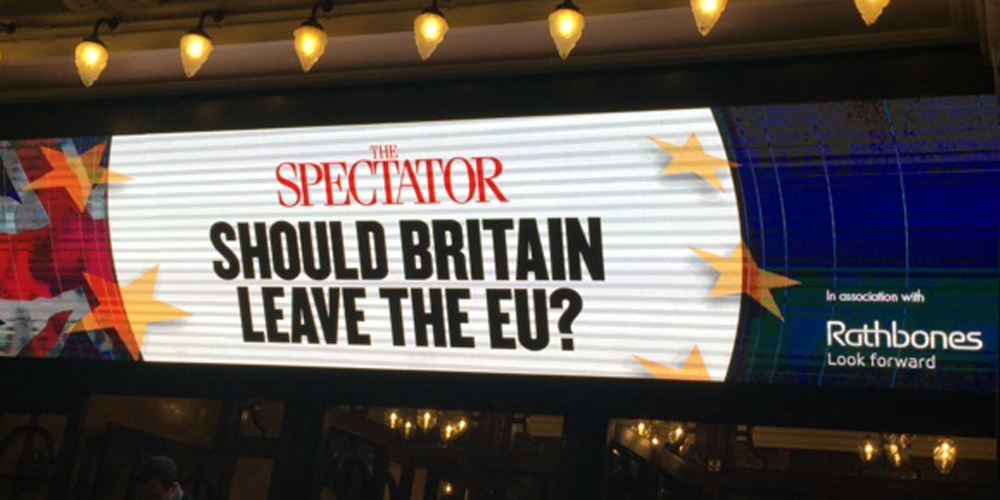Last night, I had a second row seat at the London Palladium. Fortunately, it wasn’t to see Bradley Walsh introduce a line up of Britain’s Got Talent rejects. Instead, the performance involved six politicians debating on whether the UK should remain in the EU. The ‘Old Lady of Argyll Street’ has probably never seen a show like it.

To leave or not to leave?
Sponsored by Rathbones, it was the largest event ever organised by The Spectator and drew an audience of 2,200 impassioned voters. Andrew Neil took centre stage in his signature role as moderator with the rest of the cast split in two. On the ‘remain’ side were Liberal Democrat MP Nick Clegg, Labour MPs Liz Kendall and Chuka Umunna. While on the ‘leave’ side were UKIP leader and MEP Nigel Farage, Tory MEP Daniel Hannan and Labour’s Kate Hoey.
So, whose performance captivated the audience the most? More hands were raised in support of leaving the EU, but then the debate was organised by The Spectator, which is pro-Brexit, so perhaps there was some bias?
One thing is certain, however, the debate itself was the defining act. The atmosphere within the Palladium was electric and it felt like politics actually meant something once again.
The show began with five minute monologues from each speaker with Kate Hoey delivering a passionate defence of democracy and workers rights over the European political elite. I was surprised by just how powerfully her arguments resonated with the audience.
Mr Clegg gave the most convincing performance for ‘remain’, but under questioning, he couldn’t match the fervour of Mr Hannan’s case for separation and often fluffed his lines.
Indeed, there was plenty of passion and opinion, but what of the facts?
I was actually rather astonished and disappointed by the limited grasp of basic economics on display, which further supports our view, that nobody knows the ultimate outcome should Britain leave the EU.
‘Remain’ seemed to assume the UK as a whole would be passive following Brexit despite the freedoms it would grant for using tax competition as a tool, the reduction in corporate bureaucracy and the subsidies those industries that would be hurt by Brexit. Meanwhile, ‘leave’ struggled to articulate their vision for post-Brexit.
From an investment point of view, it’s far too simplistic to assume Brexit is negative in the medium term (three to 10 years). It’s far more likely that there will be a polarisation between winners and losers, so our analysis needs to be more nuanced focusing on the micro: company-by-company. What I am convinced of (as are my colleagues) is that Brexit could create turbulence for sterling, UK equities and bonds in the short term.
This is, of course, worrying but as always the change will bring opportunities for active managers.
Following last night’s dress rehearsal for the Brexit vote, I’ll be blogging each week about the debate and its potential investment implications. I’m not superstitious, so I’ll post the first one on Friday 13 May – perhaps I’ll break a leg?!

